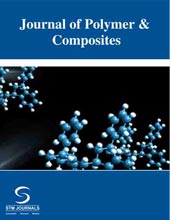Open Access

G Ram Vishal

Subha S

Rahul B
- 1School of Aeronautical Sciences, Hindustan Institute of Technology and Science Tamil Nadu India
- 1School of Aeronautical Sciences, Hindustan Institute of Technology and Science, Chennai Tamil Nadu India
- 2Department of Aeronautical Engineering, Nitte Meenakshi Institute of Technology, Bangalore Karnataka India
Abstract
Composite materials have revolutionized the field of engineering and design, providing the ability to combine two or more materials with different properties to create new materials with enhanced characteristics. The intricate process of weaving together carbon fiber and Kevlar fiber to create a 3D composite fabric is not only fascinating but also results in a beautiful, intricate pattern. Hand weaving is an art that requires precision and skill, and when combined with the use of carbon fiber and Kevlar fiber, it results in a stunningly intricate and durable fabric. The fibers are woven together at a binding angle of 45 degrees, creating a strong and flexible structure that can withstand immense stress and strain. In this work, the fabricated specimens were prepared in various architectures as a combination of carbon and Kevlar fibers. The composite was analyzed for vibrations, and the findings were contrasted with theoretical and numerical predictions. The superior stiffness and mechanical properties of carbon fibers were found to result in generally higher natural frequencies compared to Kevlar fibers.
Keywords: 3D woven composites, Vibration analysis, Carbon fiber, Kevlar fiber, Modal analysis
References
- Piergiorgio Valentino, Emanuele Sgambitterra, Franco FurgiueleMechanical characterization of basalt woven fabric composites: numerical and experimental investigation [2014]
- Strategy for introducing 3D fiber reinforced composites weaving technology: Owais Anwar Golraa, Jawad Tariqb, Nadeem Ehsancand Ebtisam Mirzad.[ 2012]
- An Overview on Fabrication of three-dimensional woven textile preforms for composites: Xiaogang. Chen, Lindsay. W. Taylor and Li. Ju Tsai.[2011]
- Development of 3-D woven composites for aircraft structures: Yoshiyuki Kobayashi, Makoto Ito. [2009]
- 3D Woven Composites: From Weaving to Manufacturing: Hassan M. El-Dessouky and Mohamed N. Saleh [2018]
- 3D Woven Fabrics: Pelin Gurkan Unal.[2012]
- Comparisons of static bending and fatigue damage between 3D angle-interlock and 3D orthogonal woven composites: Limin Jin, Zhilin Niu, Bo Cheng Jin, Baozhong Sun and Bohong Gu.[2012]
- The effect of 3D weaving and consolidation on carbon fibre tows, fabrics, and composites: E Archer, S Buchanan, AT McIlhagger and JP Quinn.[2010]
- Recent advancements in mechanical characterization of 3D woven composites: Mohamed Nasr Saleh and Constantinos Soutis.[2017]
- Effect of Microcracks on the Tensile Properties of 3DWoven Composites: Jian Huang, Qian Zhao, Yubo Feng, Haili Zhou, Fangfang Sun, Kun Wang, Chao Li, Liquan Zhang and Xuekun Sun.[2021]
- Ansar M, Xinwei W, Chouwei Z. Modeling strategies of 3D woven composites: A review.[2011]
- Characterization of mechanical behaviour of woven fabrics: experimental methods and benchmark results : Jian Cao, R Akkerman, Philippe Boisse, Jing Chen, H. S. Cheng, E. F. de Graaf,J.L. Gorczyca, P. Harrison, G. Hivet, Jérôme Launay, et al.[2008]
- V. Joshi, L.T. Drzal, A.K. Mohanty and S. Arora, “Are natural fiber composites environmentallysuperior to glass fiber,” Composites Part:A, vol. 35, pp. 371-376, 2004.
- Eberle R and Franze H., “Modeling the use phase of passenger cars in LCI.,” in SAE Total Life-cycle Conference, Graz Austria, 1998
- Bhoopathi, M. Ramesh and C. Deepa, “Fabrication and Property Evaluation of Banana-Hemp-Glass Fiber Reinforced Composites,” in 12th Global Congress On Manufacturing And Management, 2014.
- Ramesh, K. Palanikumar and K. Hemachandra Reddy, “reinforced, Mechanical property evaluation of sisal–jute–glass fiber,” Composite: Part B, vol. 48, pp. 1-9, 2013
- N Rajini, JT Winowlin Jappes, S Rajakarunakaran and P. Jeyaraj, “Mechanical and free vibration properties of montmorillonite clay dispersed with naturally woven coconut sheath composite,” Journal of Reinforced Plastics and Composites, vol. 31, pp. 1364-1376, 2012.
- Senthil Kumar, I. Shiva, N. Rajini, J. T. Winowlin Jappes and S.
Amico, “Layering Pattern Effect on Vibrational Behavior of Coconut Sheath/Banana Fiber Hybrid composite,” Materials and design, vol.90, pp. 795-803, 2016.
- Rajeshkumar and V.Hariharan, “Free Vibration Characteristics of Phoenix Sp Fiber Reinforced,” in 12th Global Congress On Manufacturing And Management, 2014.
- M Rajesh, Jeyaraj Pitchaimani and N Rajini, “Free Vibration Characteristics of Banana/Sisal Natural Fibers Reinforced Hybrid Polymer Composite Beam,” in 12th International Conference on Vibration Problems, 2015
- Jay H. Khatri, Dr Haresh P. Patolia and Ketul B. Brahmbhatt, “Analysis of Mechanical Properties of Natural Fiber Composite Beam,” Kalpa Publications in Engineering, ICRISET2017, vol. 1, pp. 233-238, 2017
- Colakoglu, “Damping And Vibration Analysis of Polyethylene Fiber Composite under Varied Temperature,” Turkish journal of Engineering and Environmental Science, vol. 30, pp. 351-357, 2006.
- G, R. V. ., Singh, D. ., & H. V, S. . (2023). Characterization of 3D Orthogonal Woven Carbon/Kevlar Composite Under Tensile Loading. International Journal of Integrated Engineering, 15(5), 167–178.

Journal of Polymer and Composites
| Volume | |
| Received | November 27, 2023 |
| Accepted | February 11, 2024 |
| Published | May 13, 2024 |

